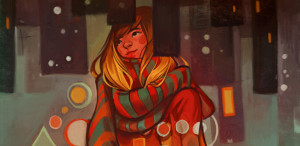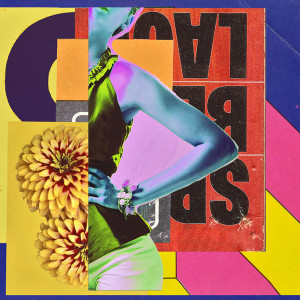The listing requires dimensions, and so there is the inevitable internal struggle. Laziness. Disorganization… Cannot find the measuring tape. Can she guess its proper size? The dresser comes to her chest. Four feet, eight inches? Width, three steps, so about three feet. Four drawers, four roomy drawers. Blonde. Birch. Curvaceous. No, curvy. Rounded. Buyers will ask about the dimensions, but if the price is good enough, the questions go away in the frenzy of Venmo.
She spends too much time on the description. Not Curvaceous. Not Roomy. Not Curvy. Contemporary. That’s a little stuffy. What about… Modern? She herself believes she is modern, but this piece of furniture is not necessarily modern. Modern-ish. Mod? It is Mod. Fifty dollars. She spent a lot more than that on it, but it all depreciates all of it, every single thing: love, friendships, childbirth. She’s sweating a bit, pacing. Jesus, it’s just a posting for Marketplace. Doesn’t have to be poetry—this is a description. This is functional. Like a menu. She wouldn’t muck up a menu with too many words. But when does she ever write a menu? She considers the digression. Too many digressions lately. Her mind is like a rabbit searching for a new warren.
If only it would stop raining. People are happier when the sun shines. It’s provable, certifiable…
A quick search for comparables. This item has a brand name. A lot of furniture in the marketplace appears by the same brand, but it’s of the “style.” This is the real deal. And it’s wood. Solid wood. Not MDF. Not veneer. Wait, no, it’s got a bit of veneer on it. Still, mostly solid wood. It doesn’t matter. Dovetail drawers… Wood. Birch. Mod. And then she needs to add a bit of personal sunshine, the words that shine a light on the experience of owning this particular chest of drawers. Purchased when our son was a boy. Now he’s a man. Good condition, a few scars—those beautiful marks of life: match burns, an Exacto knife scar. The dust is gone, but consider dust is made up of skin, of life. $50. Firm.
Publish. An action. To publish. She has published before in journals. But it’s been a while. The last journal was sort of prestigious, now out of print and only online.
The dresser appears on her screen. There it is, fully described, waiting to be discovered. Dresser. Dresses. Dressed. Mod-dresser, floral dresses, floaty dresses, sexy dresses, red dresses, dressed up and nowhere to go, dressed are the meek. Blessed are the meek? She puts that phrase into the description. Blessed are the meek, with her contact information.
It feels good to get in the mud pit with the words, slapping them around, making them conspire to tell something, anything. Mostly, she smokes. It feels good to write a bit, then smoke like you deserve it.
She waits ten minutes, then checks her messages. Four responses. One from V-Kill. Is that someone’s name? V-Kill wants the dimensions. Ignore that one. Bill D. wants to know when he can come take a look. Bill D.? Is he cute? She clicks to check. Bill D. is not cute. Six more requests for information come in. Clearly her words have worked, or the price is too low.
Then, it’s El Bast. El Bast? That’s intriguing—El Bast gushes, “I am so enamored of the piece. And the way you describe it makes me want it all the more. I am sincere in my interest. I would like to purchase it, and might I come to retrieve it tomorrow at 4 pm?”
Relief sounds like a distant barking dog. There it is, the buyer. She agrees. Yes, come at 4. I will be at home. She provides an address.
It’s strange, she thinks, that she puts on lipstick for the transaction. Berry, but this berry is more black than blue, more purple. It’s really raisin. If she were describing lipstick, she’d call it raisin, but then who wants their lips to look like a raisin? Oh, it’s very perilous choosing the right word. She is so happy to have given up that dream of finding the words to find the key to unlock the lock of a story that pleases, transports. She knits instead. Follows patterns, any pattern, one after another, sweater, cowl, mittens, gloves, socks. All put in plastic cases for a sale she’ll have to announce. In the distant future.
A Mercedes? How odd, she thinks. El Bast drives a big ass Mercedes, and she’s come all the way to this modest neighborhood to buy a dresser, Mod, for $50. She suspects that El Bast is going to try to deal, but she straightens her shoulders. She will be FIRM.
El Bast grabs something out of the back seat. Is it a box? Maybe it’s not El Bast… maybe someone is delivering something, so she calls out from the stoop, “Here to buy the Mod dresser?”
“Yes, yes!” she says. The box seems heavy.
She stands at the front of the house. “May I come inside?” El Bast asks. She’s wearing thick dark sunglasses, like she’s a fashion editor. Her hair is perfect, red, cut to her shoulders, sleek like Weimaraner fur.
She lets her just barely inside, to the porch. The dresser is partially disassembled and ready to be taken without the necessity of going into the house. El Bast puts down the box of books and surveys the seller.
“I thought I knew you. Hi,” Louse says.
Yes, she thinks, it’s someone she knew some time ago, an acquaintance, someone from the federation. El Bast… Louise Baston. It’s Louise fucking Baston. She fake hugs the seller, who recoils. She wears lipstick, and she feels ridiculous, although Louise wears boots and a fancy coat.
“You can Venmo me,” she says as she moves to the front door—
“Wait,” Louise says. “We should catch up.”
If she could run, she would, then there would be some serious catching to be done. But she’s trapped, with Louise Baston from the fucking poetry federation, the very group she left so many years ago because she couldn’t stand the pedantic accrual of success, the way each book was flaunted like a gold medal, each poem a colossus of great importance, the Greeks, the Romans, a beehive. This Louise, yes, she remembers, she got beehives just to be interesting.
Louise wears a fake fur coat. She models worn glamour; it’s in the lines on her face, in her posture. She used to be a bit of a wildcat. Of course, that’s how she described herself in her auto-erotic memoir, “Wildcat on the Loose.” The way some women flaunt their sexuality in that post-ironic, post-feminist way, Louise collected Weimar erotica, was that it?—she liked to call the images of lesbians on turntables, drawn with too sharp pencils—her ‘bad girls.’ “Wildcat on the Loose” had one of those pictures on the front.
The rain pours from the sky. She listens to the rain. It swoops with wind, like it spins on a turntable, uneven. Loud rain, pelting rain, then soft.
“Right, that book of yours.”
“I’ve written three.”
“Yes. Well, how many copies did that last one sell?” she asks although she cares nothing for the answer. She just wants Louise to take the dresser.
“Three printings. Albeit small,” Louise says.
“How wonderful for you.” She moves to the door, offering, “I have a rope in the basement?”
Louise looks aghast.
“To tie the dresser to the car, or in the trunk,” she clarifies this also for herself. Rope, now that’s an ingredient for a mystery. She writes that down in her mind as Louise takes off the fake fur, in a gesture of fake friendship. She wants to shake up the conversation before Louise answers her question about how many copies of “Wildcat on the Loose “actually sold.
She asks one of her deal-breaker questions, designed to repel, to stop conversation, to make people swear off her the way she scrapes herself out of every social situation. “Do you know how to get rid of anal worms?”
“I’m sorry, I don’t think I quite heard you—“
“Worms in the anus.”
“Got it. No. No, I don’t.” Louise doesn’t even fluster. That’s because she’s so narcissistic she can’t even hear another person speak.
She reverts to the rope. She thinks of it, the way Hitchcock might. This is her terrible flaw, an infection of her soul—she can’t stop thinking of that trap of action and consequence—and in the playing out of the rope, Louise’s neck snaps, or she ties Louise to a chair and forces her to listen to her new work. Possibilities wrap around each other. The first, she listens to Louise preen about her accomplishments; the second, she gets the rope. It’s not even a knot, it needs no untying.
No. No. She’ll use the rope to help Louise get the dresser onto her car. She wonders about the car. Did Louise purchase it used? Is it fake like the fur?… and as she contemplates the success of this person, this woman who has had articles in the newspaper written about her sexual search for self (“Wildcat on the Loose”) and who likes to tell people, “I was born in prison,” even as she was most definitely not, she knows this because she has tracked down Louise Baston’s birthplace. Johnson City, Tennessee, next to the story telling capital of the world. It just all comes back to it, to the stories… and so Louise talks about her next project. It is called, “Harmony in the Balance,” and it’s about “Eco terrorism.”
God, the self-importance.
“My next book is about anal worms. That is, worms found in the anus,” she states proudly. She will not have an article in the newspaper about her. Until she dies and maybe then a brief obit written by her sister in Chicago who avoids her unless forced to interact.
Maybe she is the problem. Repellant her. Louise opens the porch door, walks into the parlor, and sits on her Victorian chaise. Of course, Louise chose the chaise. It always attracts a certain kind of person. Like Louise.
And then she realizes. She wrote the words that brought Louise to her. Louise knew. Why else would she have brought a box of her books? Did she trap Louise, or was it the other way around? Did she use the words that would bring Louise here? If so, why? So she might make peace? Or let Louise know she is alive,even as she’s patched together a life out of animosities and avoidances? Or did Louise come to her house on the south side, where she had a “Mod” dresser for sale, so that Louise, with her predilection for mid-century modern on the cheap could regale her with tales of former glories and signal her own emptiness?
Oh Louise, we are in the same boat. The slow fade. Louise is here because she is fishing for experiences, the same way that she signs up for random classes. Basket weaving out of pine needles. Butchering a hog. (That one backfired, inspiring such repulsion over even a slice of bacon.)
“We needed to meet. All these years. Somehow it was fate,” she says.
“We did?” Louise has her box of books at her feet and pulls out another, “You Don’t Know What’s Best for You.”The gall of Louise. Louise stole the title from her published story, “We Know What’s Best for You.”
“I am the original. You are the etched version, the reproduction,” she says. She wants to spit at the book Louise holds like its show and tell.
“That’s pretty good,” Louise says. “Although I don’t know about that. I suppose you wonder about why my title is so similar to your title. Well, the reason is that you cannot own a title.”
“I am retrieving the rope from the basement,” she says. She doesn’t know if there is rope in the basement. She pauses for a moment, held in a quotation mark, or a parenthetical, as if her life is being punctuated by a person who knows as much as she does about action and consequence. And if she leaves the room? Louise might snoop, she might steal some detail from her house, which she knows is baroque, gilded, verklempt, forgotten, forbidden, pleasure-seeking.
She stomps down the basement stairs, loud enough to create suspense. The rope. Where is it now? She didn’t expect she would offer rope. There’s the rope, stuffed behind an old dusty armoire, one that she will also sell on Marketplace. The rope feels like string, but it’s not. When she picks it up, she longs for subtlety. There are only so many things one can do with a rope. She wants to surprise Louise.
As a writer, Louise favors monolithic subjects. Her third book, “Evil,” imagined the birth of Evil, daughter of Eve. Louise referenced the Bible. Genesis. She tugs the rope as if she’s testing it for a terrible task.
There are a few things to do with the rope. One of them to whip. To tie. To hang. To gag. There may be more actions. Will she do any of them? Or does she merely imagine what might happen if she had the strength and wherewithal to follow through on her worst impulses?
She wants to… oh, how she wants to hurt this smug magpie who so willingly steals her way through other people’s ideas and lives. What else is in the basement? A hammer. Nails. These seem complicated.
She wants to insinuate danger without acting upon it. Yes, that’s it. She wants to hear Louise beg for forgiveness. There. She knows what she needs from this encounter. She waits downstairs for a long time. Her thought is if she waits long enough, Louise will come down the stairs looking for her. To bide the time, she imagines the next Marketplace ad about the armoire. She’ll use words like ‘broad-chested,’ ‘grandmother of all armoires,” ‘lady in a bustle.”
Soon enough, the sound of footsteps on the floor above. Then, the sound of Louise descending. Louise put her shoes back on. Against house rules! She wants to scream at her and then tie her up.
“Hello? Are you okay?” Louise peers into the darkness near the bottom of the basement stairs.
She stifles a giggle. It’s like macabre hide and seek. How long can she stay still?
Louise calls out: “Yoo hoo?” And,“I hope you’re not hurt down there.”
She’ll wait and when Louise is close, she will leap out, rope taut. But Louise doesn’t approach. The entire cat-and-mouse game stalls. The cat awaits, but the mouse won’t play.
What exactly is Louise doing in her basement?
Louise spots her. “Oh, there you are. Everything all right?”
Now she is embarrassed. The rope goes limp. She picks up the other end and flexes it, but the room is dim, and Louise can’t see her.
“Is that for sale?” Louise points at the armoire. It’s as if she’s beating her to the punch. And in an affront to every instinct, Louise tells her that the armoire is “like a grandmother.”
Did she not come up with the same analogy? This thief of ideas, of thought! Then, she considers if perhaps the analogy is obvious. Tired, trite. Like both of them.
“Do you have the rope?” Louise asks. “I need to get going. I’ve got a meeting with my publisher.”
The jostling for position never stops. If Louise had a penis, she’d whip it out, no doubt.
“Oh?” that’s all she says, and by it she means, “I’ll be the decider of that.”
Louise waves her to walk up the stairs first. Does she suspect? She hopes so.
“It’s been lovely to visit with you.”
“Has it?”
“And your kindness in helping put the dresser on the car roof is just amazing.”
They have emerged from the darkness below into the murk of the living room. At that, there’s a knock at the door. The most handsome, golden-haired man she’s ever seen stamps his feet on the doormat.
“That will be Claude. I think I’m taking too long for him.” Louise laughs and like it’s her house, she goes to the door and lets in Claude.
“Bonjour,” he says.
“Good lord, he has an accent,” she thinks.
“Is this your…?” She wants to say, “brother.” Or “gay friend.”
“My husband. We’re just married,” Louise gushes. “The dresser is for his son. I’m just so happy I’m going to get to take part in mothering.”
What a stupid sentence, she thinks as French Claude sticks his tongue into Louise’s mouth.
The rope is limp, flaccid. Just rope. She has been castrated. She hands it over and shrugs.
In a moment, Claude is outside with the dresser and ties the dresser with her rope onto the roof of the Mercedes.
She swallows, trying to make the bile retreat to her stomach. “Louise, I wish you joy with that dresser. And joy with your work. Because I live in joy. And harmony. My plants all grow big and healthy. I travel. I, too, am married. And I relinquish all competition around the act of writing. You win. The dresser is $50. Venmo is fine. Let’s just call it a deal.”
“Would you take $35?”







